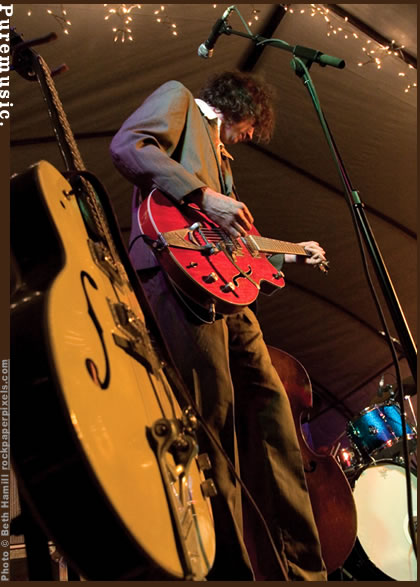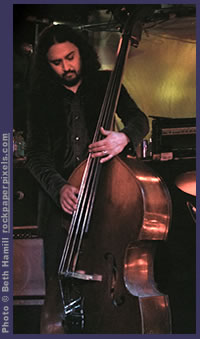
A Conversation with
Dallas Good (continued)
PM: When you guys play Toronto, are you very big in your own city?
DG: We like to think so. But we make a point of playing smaller-size venues. We've been a bit of a mainstay at the Horseshoe Tavern in Toronto for a long time, so we've played there stubbornly doing two nights, and so on, because they've been so good to us over the years, and why change--but having said that, I suppose it's any which way the wind blows, and we don't take it for granted. But we love this city, and we've always had the opportunity to do dry runs in this town with all of the people we've worked with over the years. We don't necessarily go to the people we work with, if you know what I mean. We get them to come to us. And Toronto has just been nothing but supportive over the years.
PM: Wow. I thought it was interesting that although Amanda did the photos for the record, that your buddy Rick White from The Unintended did the layout.
DG: He and I did it together. It was because Amanda had the vision, totally, for how we wanted it to be done--although there are a million computer graphic designers and illustrators out there that can do stuff like that in their sleep, basically, Rick is completely self-taught with the html code, and with any digital alterations. And I just prefer his sensibility, because he's always analog, and pen and paper minded. So I just find that he is a much better vessel than some top-dollar designer. Although he only knows what he knows, the perimeters of what I want are completely within our scope.
PM: Right.
DG: And again, it's just so nice working with a friend who is an artist that never ceases to amaze me. As an example, he designs our myspace page, which he learned how to do every single detail on that page just from trial and error, late at night, never took a course, nothing--just a genius. [laughs]
PM: And I thought your myspace page was really good.
DG: I love it. But again, I don't know the first thing about that stuff. It's all about taste, in my opinion. And again, we're very fortunate to have crossed paths with so many like-minded individuals over the years, and through mutual respect and admiration, been able to develop both a strong personal friendship and make stuff.
PM: Yeah, and speaking of making stuff, he co-wrote some really good songs on this record.
DG: That's right. He co-wrote "Anna Leigh" and "My Heart of Wood."
PM: Oh, "Anna Leigh," that's one of my favorite songs.
DG: "Anna Leigh" is the one with the 12-string, and the Lightfoot inspiration.
PM: Right.
DG: And I think it's pretty obvious to most people who know The Unintended that those two songs certainly would have been on The Unintended record, had we made one, or made another.
PM: So the last one was in 2004, The Unintended record.
DG: I know we recorded on March 3rd, 2003. Yeah, it came out in 2003.
PM: Was that the album called "ST"?
DG: Yeah, Self-Titled, exactly. It's the untitled Unintended. That's a tongue-twister.
PM: So I see that you're playing keyboards on this record, as you do in The Unintended. Is that an instrument you'll play by yourself at home in one style or another, and sing?
DG: Never. But that's what I was taught on as a child. There's a perfect example of the difference between Travis and myself. I grew up taking piano lessons; he took guitar lessons.
PM: Right, oh, those are two different roads.
DG: I, of course, had no need for the keyboards so I gravitated to electric guitars, because I heard enough punk rock.
PM: Yeah, right.
DG: But yeah, so I suppose my strengths lie more in composition and theory and lyricism, and so on.
PM: Right.
DG: And his is all from Red Shea's leather crops that he'd bust on Travis' knuckles.
PM: Yeah, he's a shredder, right. At home or on the road are you sometimes or frequently listening to music quite different from what you're generally playing?
DG: Well, take for example today I've listened to nothing but The Spiders and The Tigers, the Japanese groups. And these are records--well, two of them are from '69, one is '70. So it's a really weird time for them, because they're experimenting with all kinds of sounds. So I'm not name-dropping a garage band, or some weird Asian psych-odyssey. You don't have to print those bands, because they're so irrelevant, and I don't like being obscure. It's irrelevant to the reader. It doesn't reflect my personality. I think that the line is blurring more and more with what The Sadies can't and won't try within the scope of what we like. We don't listen to music we don't like, we don't try to make music that we don't try to like. So my record collection is relatively vast and very, very well used.
PM: Wow.
DG: But I don't gravitate towards one style, necessarily.
PM: It's curious, but many of my musician friends don't tend to listen to too much music, which is always a mystery to me.
DG: That's so true. I know so many people who really like to shut off when they get home. And I know other people who feel as if they're some type of sponge that is going to be influenced by these things in a plagiaristic way. And for me, I'm quite the opposite. I'm quick to take credit away from something because it's too familiar. And I would always use that as a guide and an absolute tenet to live by. That is to say, love whatever you do, but there's no point in spitting out the same crap.
We don't reinvent the wheel with what we do, and we're quick to list our influences. In fact, we're very quick to perform covers, and explain what has brought us to where we are musically. As you can probably tell by all the people I've name dropped in this interview already, I would never deny that we have a huge list of influences and idols, and it's shaped who we are and what we do. However, we would never try to emulate something else. We're just making sure that we're just doing what we do well together.
On the other hand, that is a total contradiction of the entire Rat Fink soundtrack.
[laughter]
DG: I just realized we made a record that was based on going like, "Okay, for this scene we're going to want something that's kind of like this." What I just said does not apply to our instrumental music or our covers. But it applies to Favourite Colours and certainly New Seasons.
PM: Right. In fact, on both of those records, especially the lyrics of the band usually have some definite weight to them, sometimes in a somewhat foreboding category. And it occurs to me to ask you, especially, if you're what you'd call a spiritual guy at all?
DG: Well, I move by the scriptures, but I don't live my life by any type of spiritual code, unfortunately, and maybe that's why there's so much torment in my storytelling. I don't know how to answer that question. Although I beg the question by always referring to verse in songs, biblical verses, passages almost directly at times. But I just like to consider those references to be for the listeners to make what they will out of it, more so than me trying to send some coded message.
PM: Yeah, and one of my favorite answers to that question is: I don't know how to answer that question.
DG: Okay.
PM: Because it shows that somebody heard the question, anyway.
DG: I want to answer the question, for sure. Like I said, I beg the question. But yeah, it's a slippery slope, I guess. I suppose if I had more answers I would ask fewer questions in songs.
PM: It's always a pleasure to talk to you, Dallas.
DG: Oh, the pleasure is all mine.
PM: Yeah. I love the new record.
DG: Thanks, Frank. It's good talking with you.
![]()
